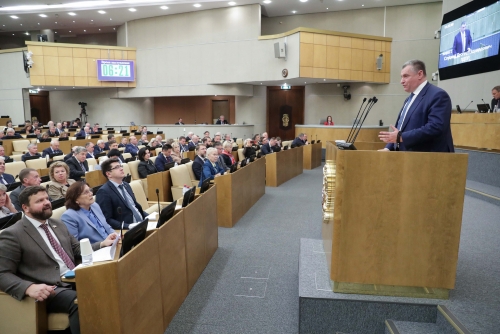Russia moves to revoke nuclear test ban treaty
AFP | Moscow
The Daily Tribune – www.newsofbahrain.com
Russian lawmakers voted on Tuesday to revoke Moscow's ratification of the Comprehensive Nuclear Test Ban Treaty, moving closer to abandoning a landmark agreement that outlaws the testing of nuclear weapons.
The move comes after President Vladimir Putin said earlier this month he was "not ready to say" whether Russia needed to carry out live nuclear tests.
Lawmakers in the State Duma lower house of parliament unanimously approved the de-ratification bill in its first reading, with 412 voting for and none voting against.
The bill can be signed into law by Putin after passing three readings in the lower house and receiving approval in the upper house, although this is largely a formality.
The Comprehensive Nuclear Test Ban Treaty (CTBT) aimed to completely ban all nuclear tests.
It never came into force as it was not ratified by all required signatories, but it did have symbolic value and helped put an end to the more than 2,000 nuclear tests carried out during and shortly after the Cold War.
Both Russia and the United States signed the treaty in 1996, but while Moscow ratified it in 2000, Washington never took the final step of codifying it into law.
"For 23 years we have been waiting for the United States to ratify this treaty," Russia's top lawmaker Vyacheslav Volodin said ahead of the vote.
"But Washington, because of its double standards, its irresponsible attitude to global security issues, has not done so," he said.
- 'Threat to existence' -
Since the start of Moscow's offensive in Ukraine, Putin and other Russian officials have given mixed signals about the possible use of nuclear weapons in the conflict, prompting alarm in the West.
Putin mobilised Moscow's nuclear forces shortly after the conflict began and has repeatedly invoked Russia's nuclear doctrine, which allows the use of nuclear weapons if the state faces a "threat to its existence".
In February this year, Russia pulled out of a separate nuclear treaty with the United States known as New START, which aimed to limit the number of nuclear warheads both sides could deploy.
During the summer, Putin confirmed Russia had sent tactical nuclear arms to its ally Belarus and earlier this month announced the successful testing of a nuclear-powered cruise missile.
However, he told journalists at a political forum in Sochi this month that Russia had "no need" to change its nuclear doctrine.
"Why should we? Everything can be changed, I just don't see the need for it," he said.
"No person in his right mind and clear memory would think of using nuclear weapons against Russia," he added.
Deputy Foreign Minister Sergei Ryabkov told reporters last week that Moscow would only resume nuclear tests if the United States did so first.
"We must ensure that our testing base is ready to resume testing activities," he was quoted as saying by Russian news agencies.
"But the resumption in practical terms is (only) possible after the relevant tests are carried out by the United States," he said.
The Soviet Union last carried out a nuclear test in 1990, while the United States' last test was in 1992.
Related Posts

